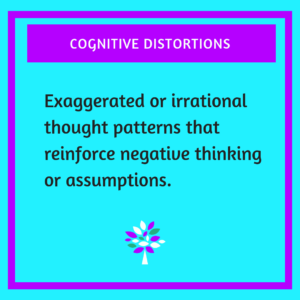Cognitive Distortions

Cognitive distortions are exaggerated or irrational thought patterns that typically support and reinforce negative thinking. For example, when a person is depressed they tend to engage in a cognitive distortion called filtering. This is when a person focuses on the negative aspects of something and filters out the positive aspects. So, a depressed person might get an A- on a test and will ignore the fact that they got an A and focus on the items they missed, berating themselves for their stupidity. This then reinforces their negative beliefs about themselves and their abilities. There are many different cognitive distortions that people engage in and most of us think this way from time to time. The problem is when we don’t recognize that this is occurring and we assume that these distortions are accurate reflections of reality. Some of the other most common distortions are black and white thinking, overgeneralization, catastrophizing, personalization, shoulds, emotional reasoning, and jumping to conclusions. It takes practice to become aware of how we are distorting our own thinking and it can be helpful at times to have a trusted other (family, friend or therapist) to gently point out when we are engaging in such distortions. Therapists can also teach you other ways of challenging these distortions and looking for evidence to gain a more balanced view. Stay tuned for more to come where I will go into more detail about the other distortions I mentioned earlier. If you are looking for a useful self-help workbook on this topic, check out Thoughts and Feelings: Taking Control of Your Moods and Your Life by McKay and Davis.










